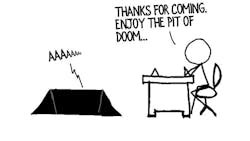In the Arabian Nights, Ali Baba, the hardworking woodcutter, is deep in the woods of Persia when he spies a band of forty thieves depositing their loot in a magically sealed cave. Later, using only the two words he overheard, he gains admittance to the treasure trove and forever changes his fortunes.
Most companies’ salespeople and senior executives are sedulous professionals but, unlike Ali Baba, they lack the magic words that will open the doors to richer rewards. Instead, they beat their heads against the cave doors; a frustrating, painful exercise that is ultimately futile. In an effort to grab a portion of their customers’ wallets, company representatives extol the benefits of their products, they reveal that doom is just around the corner if the customer’s problem isn’t addressed quickly, and they point out that only their own, whiz-bang offering is perfectly designed to deliver salvation.
Word #1: Why?
You already know this word well. Entire books have been written about the question, “Why?” and how to use it effectively. Rather than launching into the innumerable benefits and strengths of your offering, ask your customers why they think they need it. Asking “Why?” a single time demonstrates you’re a wise, Socratic investigator. Asking five times underscores your mastery of the Six-Sigma methodology. Asking 100 times reveals your inner four year-old. Stick with five times or fewer.
Some years back, I saw “Why?” employed to great effect in, of all places, a shoe store. A well-coiffed gentleman holding a black loafer he had taken from one of the display shelves approached the young sales assistant and requested she bring him a pair of that design in size 9D. Rather than scurrying back to the stockroom, the saleswoman politely inquired why the customer needed the loafers. That simple question led to a sale of three pair of expensive shoes and, no doubt, a healthier commission for the salesperson than she would have received on the original customer request.
My guess is that young woman now runs the salesforce for a zillion-dollar tech firm. If she can ask “Why?” about a pair of shoes, you and your people can employ the question for your products.
Word #2: Now
As in, “Why now?” Don’t you hate it when you drop everything to respond to a flurry of requests from a potential customer then suddenly the lead goes dark? Two weeks slide by, then two months before the whole opportunity slides into never-never land. You can save yourself a lot of grief (and win far more customers) by asking, “Why now?”
Some prospects have the attention span of squirrels—they flit from one emergency to the next. When you probe into the urgency of their need, you uncover whether the customer has hit a tipping point and are confident they need your offering or whether they’ve called you with their need-of-the-week.
Word #3: This
As in, “Why this solution?” Whether we’re battling our prospect’s corporate inertia or other, “real” rivals, most executives try to persuade their prospects that their offering is the perfect solution; that the features and benefits they deliver beat the competition by a mile. What I do is the opposite.
I point out that the prospect has many options for addressing their needs, including not taking any action, then ask, incredulously, why they would turn to an expensive offering like mine. If a customer responds, “Gee, I don’t know. You tell me,” then I know I haven’t done a good job with my basic marketing or I didn’t spend enough time with word #1 (“Why?”). Do some prospective clients decide that they don’t, in fact, need to turn to me and my services? Of course. But at that moment they were unlikely to be great customers anyway. The same holds for your business.
By the time you or your salesperson reaches a prospective customer, both you and the prospect should already have a good idea why they’re considering you. Asking them why they’d choose your solution cements the rationale better than telling them.
Word #4: Bother
As in, “Why bother?” The CEO of a small manufacturing enterprise in Indiana was in the market for a new phone system for his 50-person shop. At least half a dozen salespeople spent time in his office, demonstrating their communication products and crafting proposals that would ostensibly save him money, improve his telecommunications, boost profits and make him more handsome. Ultimately, the executive decided to stick with the current phones for another couple of years.
When you push your customers to quantify the benefit of solving their problem, you do yourself and them a huge favor. Nebulous value leads to proposals that never close, small purchases, and dissatisfied customers. Conversely, when your prospect posits powerful answers to “Why bother?” you are in the hunt for a large, high-margin deal.
These four words magic words flip the sales conversation around. In the past you may have tried to convince a prospect why your offering is important and why you’re the perfect provider. With these four words in play, suddenly the customer is trying to convince you that their need is urgent and valuable, and that they have no choice but to turn to your company. Hmm… the prospect is selling you. How do you like them apples?
Students of Arabian Nights may remember that Ali Baba’s neighbor, Cassim also gains entry into the treasure-filled caves using the magic words. Alas, since Cassim didn’t know the magic words to get back out, he died a gory death. Similarly, while the four words above will help you uncover more, high-value opportunities with customers, you may need some additional vocabulary to close the business. But that’s another story.
These four magic words flip the sales conversation around. In the past you may have tried to convince a prospect why your offering is important and why you’re the perfect provider. With these four words in play, suddenly the customer is trying to convince you that their need is urgent and valuable, and that they have no choice but to turn to your company. Hmm… the prospect is selling you. How do you like them apples?
Students of Arabian Nights may remember that Ali Baba’s neighbor, Cassim, also gains entry into the treasure-filled caves using the magic words. Alas, since Cassim didn’t know the magic words to get back out, he died a gory death. Similarly, while the four words above will help you uncover more, high-value opportunities with customers, you may need some additional vocabulary to close the business. But that’s another story.
About the Author
David A. Fields
Managing Director
David A. Fields is a speaker, author and the founder and managing director of The Ascendant Consortium, a unique organization specializing in maximizing the ROI from consulting engagements. He is the author of "The Executive's Guide to Consultants" (McGraw-Hill, 2012). He writes monthly columns for IndustryWeek and Consulting Magazine, and his commentary has appeared in USA Today, CNN Money, Investor’s Business Daily, Advertising Age, BusinessWeek, SmartMoney, and other publications.



